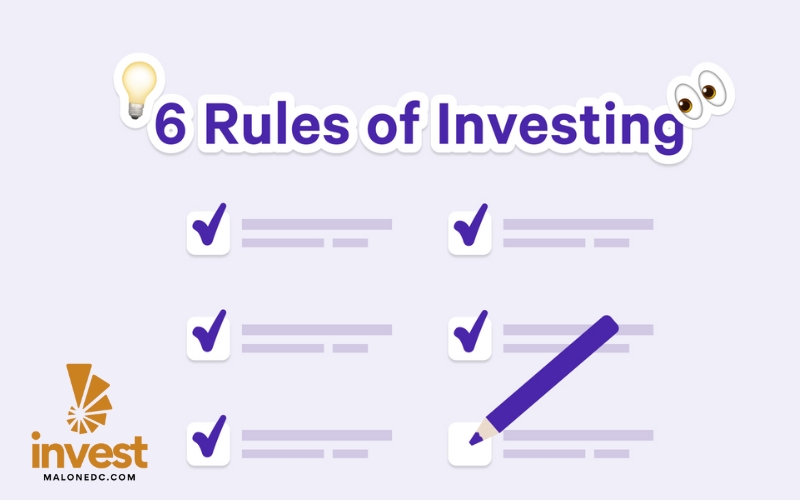However, to invest successfully, not only do you need capital but you also need a solid understanding of the basic principles and rules. These rules help investors avoid mistakes, minimize risks and maximize profits. Below are some basic investment rules that every investor should master.
UNDERSTAND INVESTMENT OPTIONS
The first rule that every investor needs to master is to understand the investment options they will participate in. Each type of investment has its own characteristics, including the level of risk and the potential for profit. For example, investing in stocks can bring high profits but comes with a high level of risk, while investing in bonds or gold can be less risky but has a lower profit. Investors need to research and learn carefully about each form of investment before deciding to participate.

ADJUST YOUR INVESTMENT PORTFOLIO ACCORDING TO YOUR GOAL
Each investor has their own financial goals, so adjusting your investment portfolio to suit your goals is an important rule. If you are investing to prepare for retirement in 20-30 years, you can choose long-term investment products with an acceptable level of risk. On the contrary, if your goal is to seek short-term profits, you can choose investment instruments such as stocks, cryptocurrencies or other financial products with stronger volatility. Determining clear goals will help you optimize your investment portfolio and make the right decisions.
DIVERSIFY YOUR INVESTMENT PORTFOLIO
One of the important rules in investing is to diversify your investment portfolio. This means that you should not put all your assets in a single type of investment. By allocating capital to different types of assets such as stocks, bonds, gold, real estate, you can minimize risk and ensure that a decline in one asset does not affect the entire investment portfolio too much. Diversification not only helps protect you from market fluctuations but also gives you the opportunity to maximize your profits from potential investment products.
RISK MANAGEMENT
Risk management is an indispensable part of investment strategy. One of the basic rules of investing is to determine the level of risk you can accept and take measures to minimize that risk. Risk management is not only about diversifying your portfolio, but also includes using financial protection tools such as futures, options or financial insurance products. In addition, closely monitoring market fluctuations and adjusting your investment strategy when necessary is also important to protect your assets.
ALWAYS MAINTAIN INVESTMENT DISCIPLINE
Investment discipline is a decisive factor for long-term success in investing. A disciplined investor will not be swept away by short-term investment fever or market emotions. Instead, they will adhere to a clear investment strategy and be steadfast in their decisions. Adhering to the principle of buying when prices are low and selling when prices are high is an important part of this strategy. Discipline also helps you avoid making hasty decisions and being easily influenced by external factors such as news or personal emotions.
LONG-TERM INVESTMENTS BETTER THAN SHORT-TERM
Long-term investment has always been considered a golden rule in investing. Successful investors do not expect to make quick profits from short-term market fluctuations. Instead, they patiently invest in assets with long-term growth potential and sustainable development. Long-term investment helps investors avoid the effects of temporary market fluctuations and brings stable profits over time. Therefore, instead of chasing short-term investment opportunities, you should focus on investments with long-term prospects.
ALWAYS MONITOR AND RE-EVALUATE YOUR INVESTMENT PORTFOLIO
Another important rule is to monitor and review your portfolio regularly. The market is always changing, and the economic situation will also have new developments. Therefore, it is very important to monitor your investments and adjust your portfolio when necessary. You need to evaluate the performance of each asset in your portfolio and make decisions to sell or buy more if necessary. If you do not have the time or experience to monitor regularly, it is also a reasonable choice to ask financial experts or use investment support tools.
REDUCE EMOTIONS WHEN INVESTING
Emotions are a big factor that affects many people’s investment decisions. Fear, greed, or regret for not participating in an investment opportunity can make you make the wrong decision. The important rule is that you need to stay calm and avoid letting your emotions dominate. A good way to do this is to stick to a pre-determined investment strategy, rather than being swayed by the immediate movements of the market. When you have a clear strategy, it is easier to stay emotionally stable and not act on anxiety or excitement.
UNDERSTAND INVESTMENT FEES AND COSTS
When you invest in financial products, you will be faced with certain fees and costs. These fees can be transaction fees, management fees, or other related costs. These costs can affect your bottom line, so it is important to understand the types of fees and costs when investing. Before investing, you should carefully understand these fees and consider how they affect your investment strategy.
CONCLUSION BASIC
Applying basic investment principles is an important part of helping investors achieve their financial goals and protect their assets. Understanding investment options, managing risk, being disciplined, and constantly monitoring and reviewing your investment portfolio will help you have a sustainable and effective investment strategy. Each investment principle brings practical benefits, and when combined together, you will be able to optimize profits and minimize risks in the investment process.
